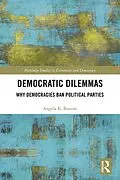This book examines how democratic communities resolve dilemmas posed by anti-system parties or, more specifically, the question of why democracies take the grave decision to ban political parties. On the one hand, party bans may 'protect' democracies, usually from groups deemed to undermine the democratic system or its core values, territorial integrity or state security. At the same time, banning parties challenges foundational democratic commitments to political pluralism, tolerance and rights to free speech and association. The book probes the deliberative processes, discursive strategies and power politics employed when democratic communities negotiate this dilemma. It examines discourses of securitization and desecuritization, preferences of veto-players, anti-system party orientations to violence, electoral systems and the cordon sanitaire as alternatives to party bans, and incentives for mainstream parties to cooperate, rather than ban, parties to achieve office and policy goals. It does so with reference to case studies of party bans, legalizations and failed ban cases in Spain (Herri Batasuna and successors), the United Kingdom (Sinn Féin and Republican Clubs) and Germany (Socialist Reich Party and National Democratic Party of Germany).
Autorentext
Angela K. Bourne is an associate professor at the University of Roskilde, Denmark
Inhalt
Introduction: Pluralism, Tolerance and the Proscription of Political Parties
Chapter 1: Theory and Research Design: From 'militant democracy' to security discourse, institutions and democratic competition
Chapter 2: Ban Regimes and banned parties in Spain, the United Kingdom and Germany
Chapter 3: Herri Batasuna and its successors: From 'Terrorist Threat' to Carrier of a 'Copernican Shift' from Violence
Chapter 4: Sinn Féin and Republican Clubs: From terrorist pariah to republicanism's pathway out of violence
Chapter 5: The Socialist Reich Party and National Democratic Party of Germany: From 'militant democracy' to declining anti-system party threats
Chapter 6: Electoral Systems as an alternative to party bans
Chapter 7: Party bans and government formation
Conclusion
